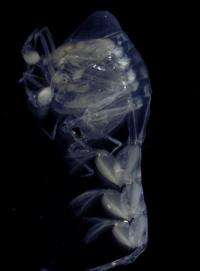Climate change could turn oxygen-free seas from a blessing to a curse for zooplankton

Zooplankton can use specialised adaptations that allow them to hide from predators in areas of the ocean where oxygen levels are so low almost nothing can survive - but they may run into trouble as these areas expand under climate change.
"OMZs are very difficult places to survive," says PhD researcher Leanne Elder from the University of Rhode Island. "But we have discovered that Phronima sedentaria have adapted in two specialised ways. Firstly they suppress their metabolism, which is very like hibernation in other animals. Secondly, while converting food into energy normally requires large amounts of oxygen, these zooplankton use a different process - anaerobic glycolysis - which allows them to use only small amounts."
These marine animals use the OMZs as refuges from predators, migrating vertically down into the OMZ during the day and returning at night to feed in the oxygen and food rich areas closer to the surface. However OMZs are predicted to expand into shallower waters as global warming continues which will force the zooplankton into a narrow band of water during the night making them susceptible to their main predators, fish. If this caused a population crash in these animals it would have impacts all the way up the food chain.
The researchers will present their results at the Society for Experimental Biology Annual Conference in Glasgow on the 1st of July 2011.
Although it provides a refuge, spending time in the OMZ does have a cost to the animals; anaerobic glycolysis results in a build up of acid which they can only dispose of when they return to surface waters. Future research needs to be done on how the reduction in oxygen rich habitat will affect these animals and hence the whole ocean ecosystem.
Provided by Society for Experimental Biology


















